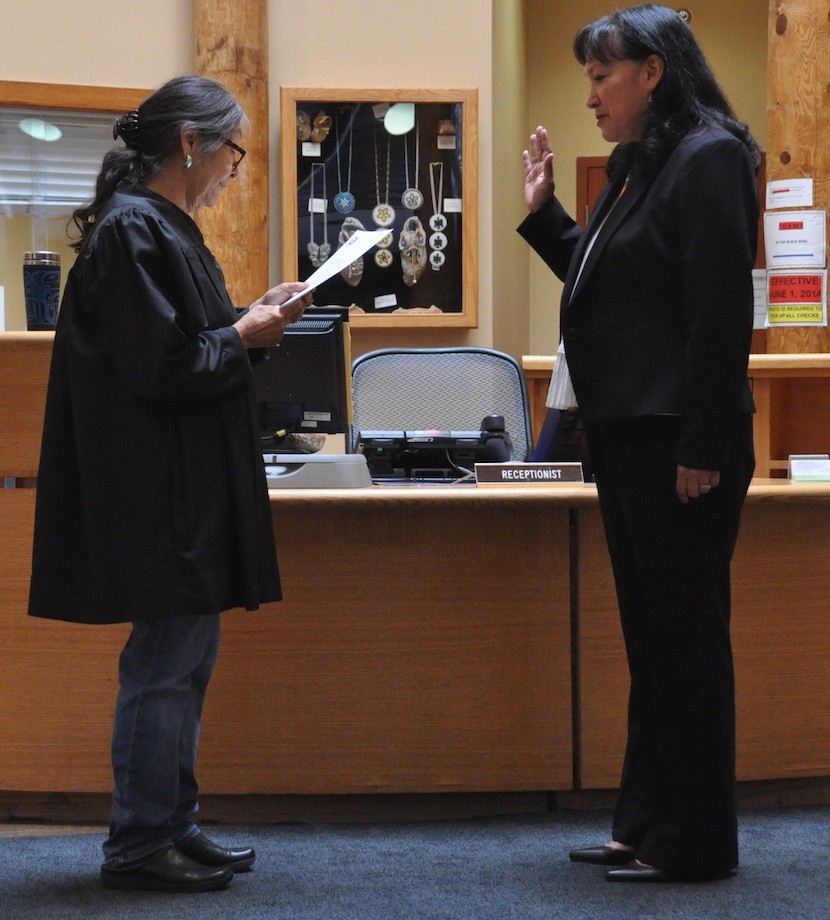
by Toya Stewart-Downey Inaajimowin Staff Writer
Some might be surprised that Rebecca St. Germaine, the recently sworn in Commissioner of Health and Human Services, has a list of more than 50 things she’d like to accomplish in her new role.
Though the list is long it’s not about how to prove how accomplished she is. Nor is it a way to impress her new bosses. It’s really all about how to make the services her department provides better for the Mille Lacs Band community.
“I chose to work in the health services area as a response to our recent health situations and policies that didn’t reflect our Indian community,” said Rebecca, a member of the Lac Courte Oreilles Band of Lake Superior Chippewa Indians. “Our Indian families were left out of the picture.”
Rebecca, who earned her doctorate in Social and Administrative Pharmacy in May 2017 from the University of Minnesota’s (U of M) Twin Cities campus, has spent her lifetime working on behalf of Indian people in some capacity or another.
She’s been an educator at the college level, a middle and elementary school teacher at Pine Grove, worked for the Mille Lacs Band’s Midewiwin Cultural Development and served as a program assistant and public health advisor for rural and community members with both the Mille Lacs Band and the Lac Courte Oreilles Band.
Rebecca has also served in many leadership roles and on boards for her own tribe. She’s worked in administrative leadership roles as well. She’s been the recipient of many awards and honors throughout her professional and academic careers. Rebecca is also an accomplished writer – having published many articles and writings in the health field.
Throughout the years, especially more recently, Rebecca said she has seen “medical and scientific research that addressed minorities and other people, but not American Indians.”
“Or they addressed American Indians in the Southwest, but not in the rural communities in the Midwest.”
“So four years ago a former tribal chairman asked me to bring new technology back to the tribe to help us get through these times,” she said. “At the same time we want to hold on to our family traditions and culture. There are not many people we can turn to that reflect our culture.
Rebecca said while there is a growing number of American Indian doctors, there are fewer who seek careers in the field of pharmaceuticals. She chose pharmacy so she could be an advocate for other American Indians.
Rebecca has been around the Band long before the casinos were built. She has relatives from Lake Lena who would meet up with Mille Lacs folks for drum ceremonies and they were like family, she said.
She grew up on the Lac Courte Oreilles reservation and still has a home there. Growing up she recalls that her grandmother’s home in White Fish didn’t have electricity or running water. They had an outhouse and drew their water from a well.
“We didn’t have ceremony food, we just had food,” she said.
She grew up in a large family, which includes her brother Dave Anderson who started Famous Dave’s restaurants. She remembers learning to bead and sew when she was six years old. She learned other traditions, too, like working with birchbark, hunting, fishing, and participating in powwows.
“We were heartfelt in our ceremonial ways,” said Rebecca, who is a women’s traditional dancer.
She was taught many of these things from her mom and her aunties for whom English was not their native language. Rebecca is also married to newly sworn in Education Commissioner, Rick St. Germaine.
One of the big things Rebecca wants to accomplish during her four-year appointment as a commissioner is to address the growing opiate addiction that is plaguing Indian Country.
“I want to work with the public health, medical an tribal leaders and police to bring a dialogue to address the challenges of the opiate addiction,” she said. “Not understanding how medication works, what they (medicines) are doing and what they do and don’t do is important.”
She plans to work with the U of M College of Pharmacy to bring what’s known as “precision medicine” to the Band.
“It tailors medications to an individual and it’s a great first step in providing education and understanding,” she continued. “It can be done through computer simulation rather than with the patient.”
Health care providers and staff who work for Health and Human Services will be more visible in the community to help develop trusting relationships. They will cultivate open dialogue between the providers and clients.
“We are doing this because we want to engage and establish trust,” she said. “That will allow our clients the freed to ask anything about their health, welfare and safety.”
Another “to-do” on her list is to change policies to provide health access to all people at Nay Ah Shing Clinic. Along those lines, there will be a new clinics built in Districts I and II in the coming year, which will “bring economic stimulus,” to the area, she added.
“It’s really an exciting time for the Mille Lacs Band because the Mille Lacs Band will be the apex for starting something great,” said Rebecca. “We’re using all of our resources and expanding them for the Band for other tribes.”
“We’re collecting accurate data that represents tribes instead of relying on the state or Indian Health Service, we using data from our band and we’d like to use that model to build upon our strength.”
“We have so much to be proud of and the band can be recognized nationally as a health provider,” she continued. “We have triumphed over health issues and we’re still here. We’re still the original people and still Anishinaabe.”